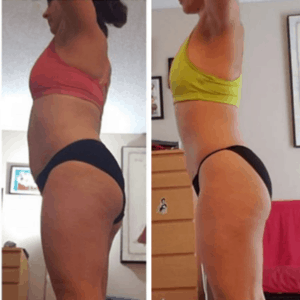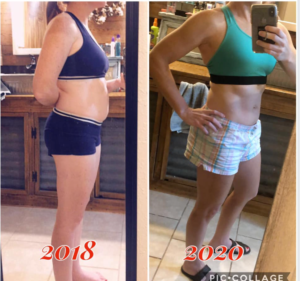
I often get messages with this question: “I just can’t seem to lose the last 5-10lbs! What do I do?”
Of course each of us is different, and influenced by many factors including age, gender, family history, past injuries, food allergies and more – but a few simple rules of thumb have helped me, and so many of my friends and clients.
Before you go any further, be sure you have read The Truth About Your Weight – because the number on the scale should not be the ONLY indicator of where you are at – and understanding how body composition (your muscle, fat, body water and skeletal mass all impact your “weight”) factors into that one single number is an important part of understanding whether you really need to lose pounds vs whether it’s body fat.
1. Prioritize quality sleep.

The amount of sleep you get will determine whether you lose muscle or body fat. When you don’t sleep well, your hormones are impacted causing testosterone and growth hormone (HGH) to drop, impairing your recovery and making it harder to build muscle and lose fat. In fact, you may become more prone to store fat.
Lack of sleep also causes cortisol (stress hormone) levels to rise and remain elevated. This chronic high level of cortisol can inhibit your weight loss efforts and actually promote the breakdown of your hard-earned muscle by interfering with the mechanisms that repair your muscle tissue.
This is something that we want to avoid at all stages of life, but especially as we age. The more muscle we have, the less body fat we have which is great for our heart, our joints and overall level of health.
Some actions you can take: get in bed early enough to wind down with a book or other quiet activity like journaling. Limit light exposure from blue light prior to bedtime. Limit alcohol consumption and food a few hours before bed. Limit high intensity exercise a few hours before bed. Try taking a hot bath an hour before bed. Use a natural herbal supplement like Whole Sleep (from my supplement line).
2. Are you eating whole foods consistently?

Even if “sugar” isn’t one of the main components of those snack foods, processed flour or processed carbs may be featured, and when carbs are devoid of fiber they end up hitting your bloodstream fast and spiking your blood sugar. The more sugar in your system the harder your body has to work to put it all to use. Your body will put some sugar away to store in your liver and muscle tissue (a finite amount) and use some for immediate energy. But if it’s got more than it needs, it packages it up and it goes to fat storage.
It’s a lot easier to notice when you’re full and satisfied when you eat carbohydrate rich whole foods that contain fiber, as it slows down how fast that natural sugar hits your bloodstream helping you control your intake. Prioritizing protein in your meals is also super smart, because not only do you need the amino acids for many bodily functions and as building blocks for muscle tissue, protein is even more satisfying than fat or carbohydrates – so ensuring you’ve got protein in your meal will make you that much more satisfied and full – making you less likely to overeat or want to snack later on.
Start each week with a PLAN and prep some, or most of your food ahead of time.
Check out the Body Fuel System for some serious inspiration and instruction, and cook/prep and eat at home and pack your smoothies, shakes and food for the day. This saves money and will completely stabilize your blood sugar because you will always have healthy food available.
3. Avoid/limit alcohol consumption.
If your goal is fat loss, I would caution you to be extremely moderate in your choice to consume alcohol, because of the effects it has on your fat-regulating hormones and your willpower to consume sweet and salty foods.
Alcohol consumption will:
- Increase your appetite
- Lower your fat metabolism and testosterone levels for up to 24 hours
- Block the production of an energy-building molecule called Acetyl-Co-A. Energy depletion affects metabolism, and hence, fat loss.
- Cause cortisol levels to rise – increasing the breakdown of testosterone. Testosterone is responsible for muscle growth, among other things. The more muscle you have, the better your body’s ability to burn fat – so decrease in testosterone=decrease in fat burning
- Increase the workload of your liver, kidneys and cells as they work to filter it through your system.
If you do choose to enjoy some alcohol, stick to lower alcohol options. I personally love Dry Farm Wines because they choose organic wines that always are 12.5% alcohol or lower (which is pretty low compared to most commercial wines) and the wine has been “fully fermented” meaning the yeast eats all the sugar and creates a sugar free wine (0-0.15g of sugar per glass).
4. Tune into stressors and actively practice self care to reduce them.

Cortisol is anabolic to fat and catabolic to muscle, meaning it helps maintain body fat and leads to the break down of muscle tissue. The opposite of what we want for our health and fitness goals.
Add a breathing or meditation practice to your daily routine, bring more yoga or mindful movement into your life, journal more, actively take time to think of your gratitudes, and never hesitate to seek the support of a trained counselor if you need support for the many things you juggle daily. You can also check out Serenicalm, the herbal supplement I created to help reduce stress and anxiety. I actually like taking it a little before bed, as I find I get amazing sleep. It’s fantastic for supporting your stress response at any time of day.
5. Stick to a consistent, balanced training schedule.

Be consistent with your training. That means balance when it comes to the type of training you’re doing – don’t go hard 7 days a week. Take your rest days so your body can recover, and you can bring 100% to each workout you do. Overtraining is as much a culprit in plateaus and stalled results as inconsistency.
Target your full body over the course of the week. Include some HIIT (high intensity interval training) and some resistance training to target fat loss and muscle sculpting.
Try out this fun 5 day food and fitness challenge for a great follow up to this post, and I’ll share a different workout plus a nutrition tip each day.
Remember to love yourself along the way, and avoid the fast-fix traps that can sabotage your long-term health.
It’s a journey, not an overnight trip. Creating a lifestyle of consistent, healthy practices will support you for your entire life – not just a hot minute.
There will be times in your life when exercise and nutrition just won’t be enough to “tip the scales” and you’ll need outside support from a doctor or professional. As we get into our 40’s and 50’s and experience fluctuations in our hormones and cycles, it’s a great idea to seek out this kind of support. But these lifestyle practices are still going to be relevant, and they will give you added resilience even as you go through life transitions. If this applies to you right now, check out the Women’s Health section of this website, with lots of great interviews with doctors who specialize in these areas.

